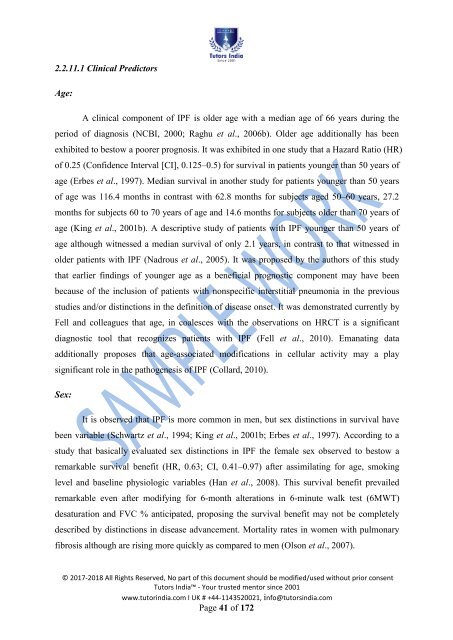Systematic-Review-Drug-Efficiency-Dissertation-Sample-Work-Tutors-India
Idiopathic Pulmonary Fibrosis (IPF) as the name suggests is a progressive disorder with no known aetiology. It is characterised by the thickening of the alveoli due to scarring resulting in cough. It is known to primarily occur in older adults over 60 years of age. The findings of IPF have a known association of Usual Interstitial Pneumonia (UIP) (Raghu et al., 2011; Kawano-Dourado & Kairalla, 2013; Wells, 2013). It has been deemed that the prognosis is generally poor when UIP has been confirmed (King et al., 2001b). The median survival rate of IPF is 50%, typically around two years after diagnosis (Raghu et al., 2011; King et al., 2001b).
Idiopathic Pulmonary Fibrosis (IPF) as the name suggests is a progressive disorder with no known aetiology. It is characterised by the thickening of the alveoli due to scarring resulting in cough. It is known to primarily occur in older adults over 60 years of age. The findings of IPF have a known association of Usual Interstitial Pneumonia (UIP) (Raghu et al., 2011; Kawano-Dourado & Kairalla, 2013; Wells, 2013). It has been deemed that the prognosis is generally poor when UIP has been confirmed (King et al., 2001b). The median survival rate of IPF is 50%, typically around two years after diagnosis (Raghu et al., 2011; King et al., 2001b).
Create successful ePaper yourself
Turn your PDF publications into a flip-book with our unique Google optimized e-Paper software.
2.2.11.1 Clinical Predictors<br />
Age:<br />
A clinical component of IPF is older age with a median age of 66 years during the<br />
period of diagnosis (NCBI, 2000; Raghu et al., 2006b). Older age additionally has been<br />
exhibited to bestow a poorer prognosis. It was exhibited in one study that a Hazard Ratio (HR)<br />
of 0.25 (Confidence Interval [CI], 0.125–0.5) for survival in patients younger than 50 years of<br />
age (Erbes et al., 1997). Median survival in another study for patients younger than 50 years<br />
of age was 116.4 months in contrast with 62.8 months for subjects aged 50–60 years, 27.2<br />
months for subjects 60 to 70 years of age and 14.6 months for subjects older than 70 years of<br />
age (King et al., 2001b). A descriptive study of patients with IPF younger than 50 years of<br />
age although witnessed a median survival of only 2.1 years, in contrast to that witnessed in<br />
older patients with IPF (Nadrous et al., 2005). It was proposed by the authors of this study<br />
that earlier findings of younger age as a beneficial prognostic component may have been<br />
because of the inclusion of patients with nonspecific interstitial pneumonia in the previous<br />
studies and/or distinctions in the definition of disease onset. It was demonstrated currently by<br />
Fell and colleagues that age, in coalesces with the observations on HRCT is a significant<br />
diagnostic tool that recognizes patients with IPF (Fell et al., 2010). Emanating data<br />
additionally proposes that age-associated modifications in cellular activity may a play<br />
significant role in the pathogenesis of IPF (Collard, 2010).<br />
Sex:<br />
It is observed that IPF is more common in men, but sex distinctions in survival have<br />
been variable (Schwartz et al., 1994; King et al., 2001b; Erbes et al., 1997). According to a<br />
study that basically evaluated sex distinctions in IPF the female sex observed to bestow a<br />
remarkable survival benefit (HR, 0.63; CI, 0.41–0.97) after assimilating for age, smoking<br />
level and baseline physiologic variables (Han et al., 2008). This survival benefit prevailed<br />
remarkable even after modifying for 6-month alterations in 6-minute walk test (6MWT)<br />
desaturation and FVC % anticipated, proposing the survival benefit may not be completely<br />
described by distinctions in disease advancement. Mortality rates in women with pulmonary<br />
fibrosis although are rising more quickly as compared to men (Olson et al., 2007).<br />
© 2017-2018 All Rights Reserved, No part of this document should be modified/used without prior consent<br />
<strong>Tutors</strong> <strong>India</strong> - Your trusted mentor since 2001<br />
www.tutorindia.com I UK # +44-1143520021, info@tutorsindia.com<br />
Page 41 of 172


















